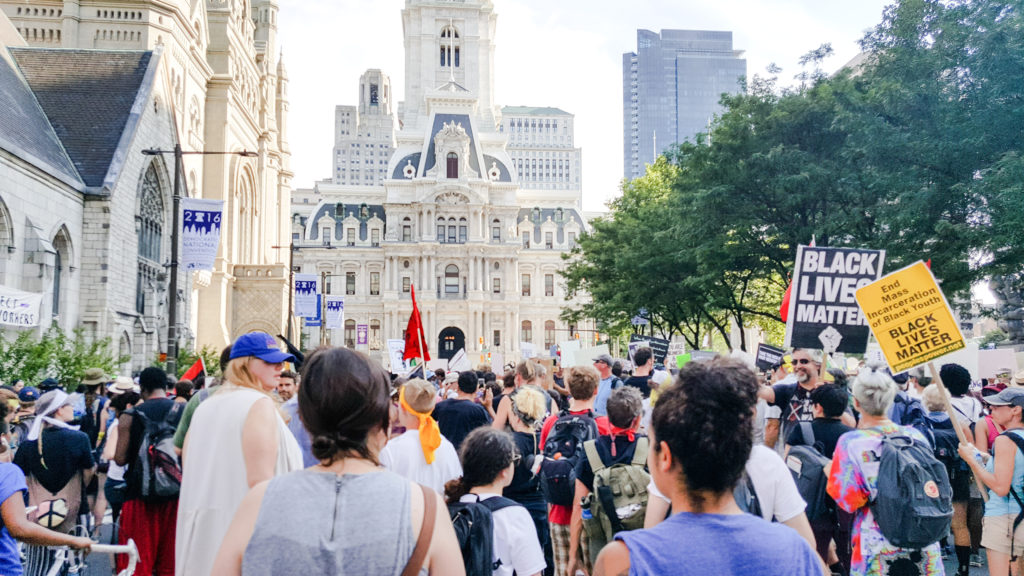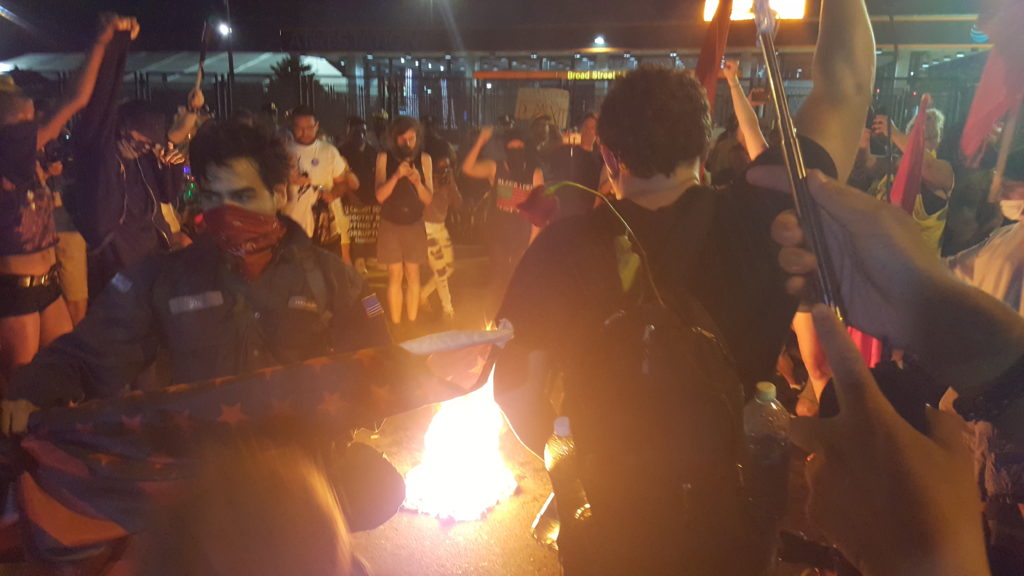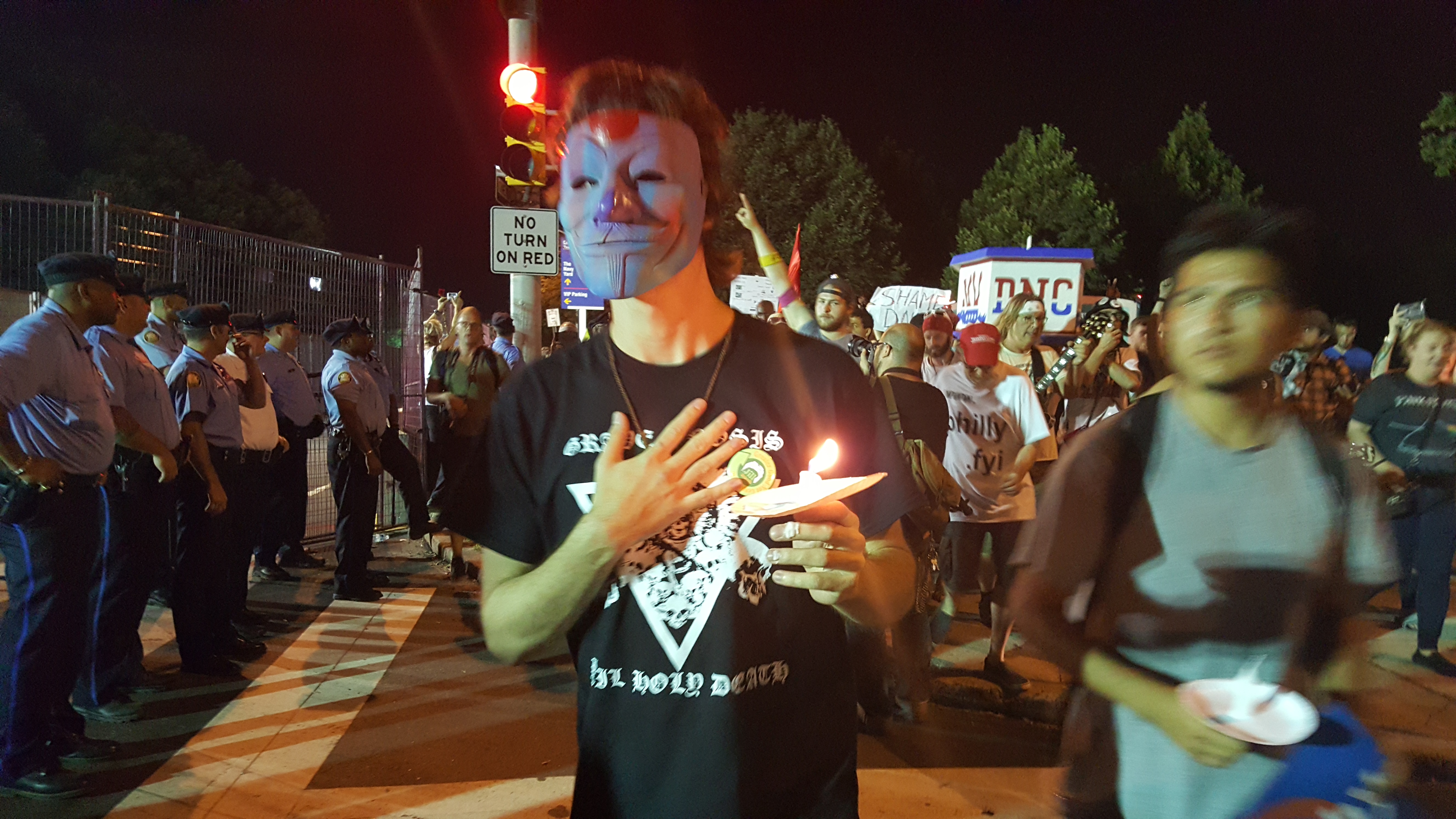I just got back from Philadelphia, where I was covering protests at the Democratic National Convention for MintPress News, so I spent a lot of time observing the activists taking the streets in America.
I’m impressed by the passion and righteous anger so many people are feeling right now, especially those of you who feel betrayed by the Democratic Party. Many of you may be taking the streets, attending nonviolent direct action trainings, and feeling the joy of holding a public space for a cause for the first time in your lives.
I don’t want the post that follows to sound like an “old man yelling at clouds,” but I’ve been an activist for a while now. I don’t claim to be the world’s greatest expert in street protest tactics, but I saw a few things that concerned me in Philly.
As an activist and gonzo journalist, I’d be remiss if I didn’t express my concerns in the hopes that we can all be more effective and keep this energy going for the long haul, so let me stress this again …
I love your passion and your righteous anger, but let’s consider these important lessons I wish I’d known when I first started out.

Police are not your friends.
The police in Philadelphia were less violent than police at many protests, including outside the Republican National Convention. They only rarely wore riot gear, and only sometimes acted threatening with their blunt weapons, and only used pepper spray a handful of times. They tolerated open use of cannabis during multiple marches.
Bernie or Bust! Police pepper spray Sanders supporters outside #DNCinPHL https://t.co/Can2KxKywq pic.twitter.com/kIgfYWl0EF
— Ruptly (@Ruptly) July 27, 2016
That doesn’t mean they’re our friends and they don’t support your First Amendment rights.
At the beginning of Occupy Austin, we had lengthy debates about whether the police were part of the 99%. At the same time, police were working to undermine our movement: at least 6 undercover agents were among us, and would eventually orchestrate a scheme that saw 7 activists charged with felonies.
At Occupy Cleveland, police preyed on the most disaffected of the group and entrapped them in a bomb-making scheme. During the 2012 NATO protests, undercover officers sent 5 activists to jail using similar claims.
Just because police were posing for selfies instead of busting heads, doesn’t mean they weren’t in your ranks, looking for ways to lock you up for a long, long time.
Weds night at #DNCinPHL : protesters breach security perimeter, police attack crowd. #DemsInPhilly #DemConvention pic.twitter.com/2jEjQUmAJ3
— UNICORN RIOT (@UR_Ninja) July 28, 2016
I’ll say it again: Police are not your friends. Don’t speak to them about your plans or what other activists are doing. Don’t tell them you love them as they’re threatening you, by their very presence, with the possibility of chemical weapons, physical injury, jail time or even death.
They are government agents whose job is to uphold the status quo, and almost every single one of them is looking the other way at murderers and rapists in their ranks. Remember this.

Your chants must mean something.
What do we want?
Justice!
When do we want it?
Now.
And — If — We — Don’t — Get — It?
Shut it down! Shut it down!
This was a popular chant outside the Democratic National Convention, but even as the group chanted it, it seemed like they little idea what they were saying.
"What do we want? Justice! If we don't get it, shut it down!" #DNCinPHL pic.twitter.com/JjpDhQXicq
— Mx. Kit O'Connell (@KitOConnell) July 29, 2016
A chant has to mean something. Although our movements are nonviolent (more on that later), our chants have an implicit threat in them. For example:
No Justice! No Peace!
means that if we don’t get justice, there won’t be any peace.
Similarly, if you threaten to “shut it down” if you don’t receive “justice,” then you must know what justice would look like, and what, when, and how you will shut “it” down if you don’t get it.
Most of all, realize the power of your numbers: when you have 1000 people, full of energy and ready to take on the world, don’t march into an empty park — hold your speak out in the streets (as Philly Coalition for REAL Justice did last Tuesday)! All of this is doubly true when police are actively trying to avoid making arrests like they did during the DNC.
Get as close as you can to the places of power, and make them listen to your demands.

Embrace diversity of tactics.
While many of us are devoted to nonviolence, it may surprise you to learn that there is not a single accepted definition of “violence.”
Some people consider flag burnings, shaking fences, or saying “fuck you” to a threatening police officer to be violence, but others do not. For some people, property damage is violence, while others consider only direct assault to be violence.
From a certain perspective, aggressively confronting another activist you disagree with is also violence, or at least creates the potential for violence. Confrontations between activist groups can draw unwanted attention to acts of civil disobedience, putting protesters at risk of jail time. It can also put all groups present at risk — whether from a protester catching on fire as she tries to put out a burning flag, or just by giving police an excuse to attack.
Last night, a self-proclaimed pacifist tried to stamp out a burning flag & caught fire themselves. #DemsInPhilly pic.twitter.com/48EyyTYRZr
— UNICORN RIOT (@UR_Ninja) July 28, 2016
There’s also the real danger of “snitch jacketing,” when you accuse someone of being an agent provocateur simply because you disagree with their politics.
Instead of confronting activist groups you disagree with, allow them to coexist with you in a public space. You can physically distance yourself, if necessary, or endangered, but by allowing all of us to do our work, our numbers can grow and we all get closer to reaching our goals. This is called diversity of tactics.
Remember those implicit threats I pointed out above in the section on chanting? Diversity of tactics can be used to your advantage when talking to the media, by turning it into a sort of “good cop, bad cop” routine — if you’ll allow me to borrow tactics from the police for a moment.
We aren’t part of that group, and we don’t endorse their tactics. We would never <shake fences / burn flags / smash a Starbucks window>.
But you have to understand, people are angry. We can’t control that anger, and as long as there is no justice, there can’t be peace.
No justice, no peace. And don’t we have more to gain by building bridges than walls?
These are just my initial thoughts, based on my observations on the ground in Philly. I’m not a protest expert, and I know there’s no end of advice that could be offered to new activists. I’d love to hear your ideas, and your answers to this question:
What advice do you wish you’d received when you were just starting out as an activist?
I’ve already started a Facebook thread, and you also can send me a Tweet or comment on this post.
 Advice For Bernie’s ‘Revolution’ & Other New Activists After DNC 2016 by Kit O’Connell is licensed under a Creative Commons Attribution 4.0 International License.
Advice For Bernie’s ‘Revolution’ & Other New Activists After DNC 2016 by Kit O’Connell is licensed under a Creative Commons Attribution 4.0 International License.
